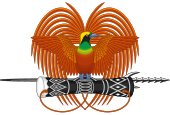
The prehistory of Papua New Guinea can be traced to about 50,000–60,000 years ago, when people first migrated towards the Australian continent. The written history began when European navigators first sighted New Guinea in the early part of the 17th century.
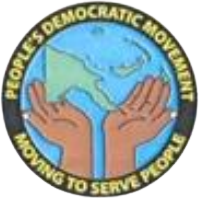
The People's Democratic Movement is a political party in Papua New Guinea.
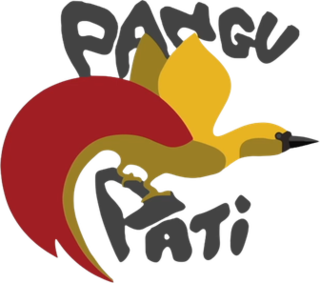
The Pangu Pati, also known as the Pangu Party or Papua and Niugini Union Pati, is a political party in Papua New Guinea. Following the July 2022 elections, the party had 39 of 111 seats in the National Parliament.
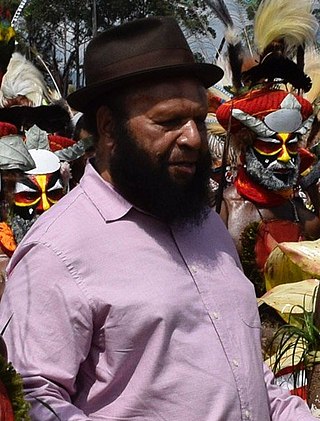
Paias Wingti is a Papua New Guinean politician. He served as the third Prime Minister of Papua New Guinea between 1985 and 1988, and again from 1992 to 1994.
The United Party is a political party in Papua New Guinea. As of May 2019, it has one seat in the National Parliament and is led by Minister for Foreign Affairs, Rimbink Pato.

The People's National Congress is a political party in Papua New Guinea. Its former leader Bill Skate served as Prime Minister from 1997 to 1999 and as speaker of Parliament from 2002 to 2004. Skate died in 2006 and the party was led by Peter O'Neill until 2022. PNC originated from the National Capital District where former leader was the Governor of NCD and the Parliamentary Member. The party had 16 members in the 113-seat National Parliament of Papua New Guinea as of December 2022.
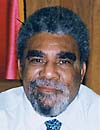
Sir Mekere Morauta was a Papua New Guinean politician and economist who served as the 7th Prime Minister of Papua New Guinea from 1999 to 2002. Inheriting a depressed economy and a fractious legislature, he embarked on fundamental reforms of the country's economy and political system.
Puri Ruing is a Papua New Guinean politician. He was a member of the National Parliament of Papua New Guinea from 1997 to 2002 and from 2007 to 2012, representing the electorate of Dei Open. He served as Minister for Justice under Mekere Morauta, Minister for Internal Security under Michael Somare and Minister for Civil Aviation under Peter O'Neill.

James Marape is a Papua New Guinean politician, who is serving as the Prime Minister of Papua New Guinea since May 2019. He has been a member of the National Parliament of Papua New Guinea since July 2007, representing the electorate of Tari-Pori Open in Hela Province in the highlands. He has held Cabinet Posts as Minister of Education (2008–2011) and Minister of Finance (2012–2019). Marape entered the 2022 elections under the banner of Pangu Party and won more seats than any other party. He was therefore entitled to form the government. His new government was elected unopposed by the new parliament.

General elections were held in Papua New Guinea between 18 June and 9 July 1977, the first since independence from Australia in 1975. The Pangu Party led by Prime Minister Michael Somare emerged as the largest in the National Parliament. Somare subsequently formed a coalition government with the People's Progress Party (PPP) and several independent MPs. Voter turnout was 60.3%.

General elections were held in Papua New Guinea between 5 and 26 June 1982. The result was a victory for the Pangu Party, which won 51 of the 109 seats. Voter turnout was 52%.
Iambakey Palma Okuk was an independence leader in Papua New Guinea and served as Deputy Prime Minister, the nation's first Minister for Agriculture and Fisheries, and repeatedly in the capacity of Minister of Transport, Minister of Primary Industries and Opposition Leader. He is known as Papua New Guinea's "most colourful and controversial politician". Okuk first led protests against unfair labor practices, and then once elected to office, worked to reserve sectors of the economy for citizens as a method of returning a complex economic role to Papua New Guineans. In the post-independence decade, Okuk built a coalition of minority political factions which forced a successful change of government, in which he became Deputy Prime Minister.
Akoka Doi is a Papua New Guinean politician. He was a member of the National Parliament of Papua New Guinea from 1977 to 1992, representing the electorate of Ijivitari Open.
Edward Ramu (Ted) Diro GCL CBE is a Papua New Guinean politician and soldier.

Samuel H. Basil was a Papua New Guinean politician. He was a member of the National Parliament of Papua New Guinea from 2007, representing the electorate of Bulolo Open, until his death in 2022. From 8 June 2019, to August 2019 Basil served as the Treasurer of Papua New Guinea.

General elections were held in the Territory of Papua and New Guinea between 19 February and 11 March 1972. They saw the election of the country's first female MP, Josephine Abaijah.

General elections were held in the Territory of Papua and New Guinea between 17 February and 16 March 1968.
Posu Ank was a Papua New Guinean politician. He served as a member of the National Parliament between 1977 and 1982.

General elections were held in Papua New Guinea from 4 to 22 July 2022 to elect the members of the National Parliament for a new five-year term.
Events in the year 2022 in Papua New Guinea.
